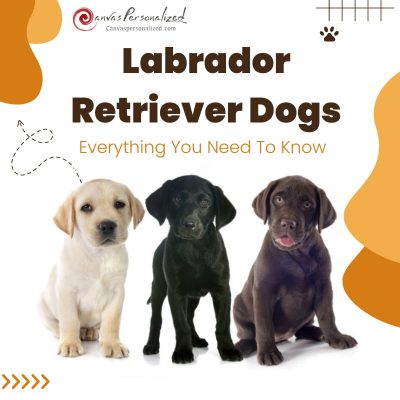Overflowing with energy, intelligence, and an adorable button nose, the Aussiedoodle dog quickly becomes a popular choice for active families. These playful pups, a mix of the Australian Shepherd and Poodle, combine the best of both worlds: the loyalty and intelligence of the Aussie with the hypoallergenic coat and trainability of the Poodle. But are Aussiedoodles the right fit for you? This comprehensive guide from Canvas Personalized will give everything you need to know about this energetic and affectionate breed.
1. Aussiedoodle Breed Information
Key traits of Aussiedoodles
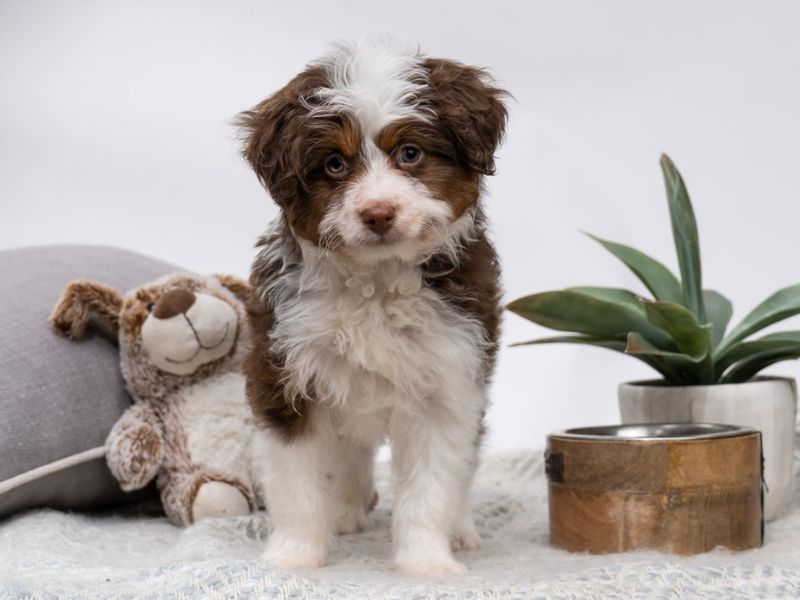
| Origin | Northern Europe | Good With | Families, children, cats, and other dogs |
| Dog Breed Group | Hybrid/ Mixed breed dogs | Temperament | Gentle; friendly; willful; outgoing and playful |
| Common nicknames | Aussiepoo/ Australian shepherd poodle/ Aussiepoodle | Energy Level | Active; High |
| Height | 18-23 inches | Shedding | Seasonal |
| Weight | 15-70 pounds | Tendency to Drool | High |
| Coat | Medium; curly or long | Snore | High |
| Color | Gray; blue; cream; white; fawn; red; brown; chocolate; liver or black | Bark | When necessary |
| Life span | 10-14 years | Easy To Train | High |
| Other traits | Aussiedoodle hypoallergenic; good hiking companion; hot weather tolerant; apartment-friendly; high prey drive; strong loyalty tendencies and loves water. |
Aussiedoodle History
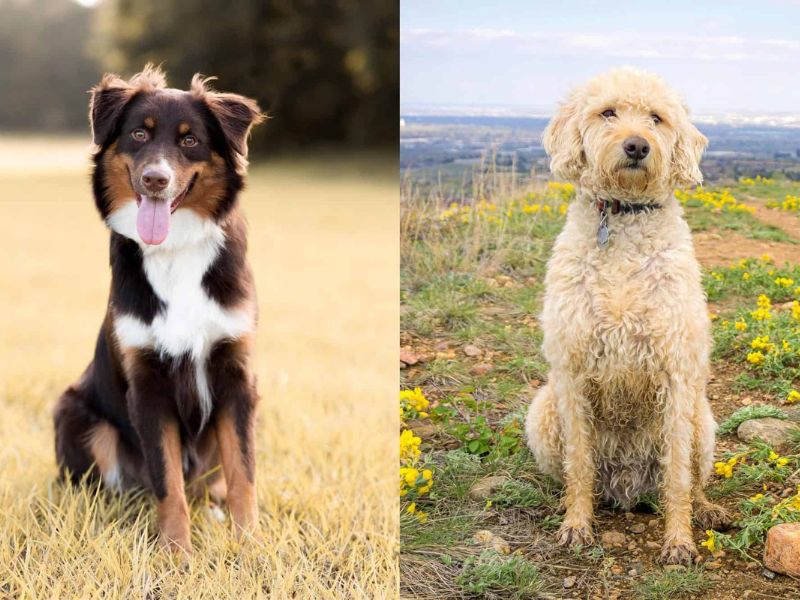
While random mixes of Australian Shepherds and Poodles may have occurred throughout history, breeders in North America deliberately began creating Aussiedoodles in the late 1990s or early 2000s. This desire to combine the intelligence and trainability of the Australian Shepherd with the hypoallergenic coat of the Poodle led to the rise of this famous designer dog.
It’s important to note that while Aussiedoodles and Australian Labradoodles share similar names and some physical characteristics, they are actually distinct breeds. When buying or adopting an Aussiedoodle dog, it’s crucial to be cautious to avoid ending up with an Australian Labradoodle instead.

Appearance
Since Aussiedoodles are a mixed breed, they can come in different sizes. You can expect Aussiepoodle dogs to range in the following sizes:
- Toy (under 15 pounds)
- Mini (15-30 pounds)
- Medium (35-50 pounds)
- Standard (50-70 pounds)

Even though Australian shepherds and poodles have long, narrow snouts, Aussiedoodle puppies have broader skulls, shorter muzzles (and even mustaches! ), and more prominent noses. What’s lovely is that their ears are perpetually wooly and flappy.
Like any mixed breed, the appearance of Aussiedoodle dogs comes in a wide variety! Their fur can be either soft and straight like an Australian Shepherd or wavier and curlier, taking after the Poodle side. The colors are just as diverse, ranging from blue merle or red merle patterns to classic black and tan (known as “phantom”), rich sable tones, or even solid colors in some pups.
Also, the merle or piebald genes have some effect on the different shades of blue, green, pale amber, and dark brown in an Aussiedoodle’s eyes. It is called heterochromia, which causes two eyes to have different hues in some dogs.
Aussiedoodle Temperament
This breed of dogs is known for their high energy levels and endurance, making them perfect companions for family adventures. Whether going on hikes, long walks, visiting the park, or even exploring the backyard, they are always ready for some excitement.
Like Beagle dog breeds or French bulldogs, Aussiepoos love spending time with their humans and crave attention. They’re happiest when included in your activities. They also tend to develop a strong bond with one or two people, making them ideal companions and even excellent therapy dogs.
However, Aussiedoodles aren’t fans of being alone. If left for extended periods, they might become vocal, which could be an issue if you have close neighbors.
Aussiedoodles retain some herding instincts, which means they might try to “herd” children or small pets, accidentally knocking them over. This herding tendency can also lead to some nipping. To prevent any potential problems, starting socializing and training your Aussiedoodle from a young age is recommended.
Are Aussiedoodles Good Family Dogs?
Aussiedoodles have the potential to be fantastic family dogs, bringing joy and companionship to your household. They’re also intelligent and eager to please, which makes them responsive to training.
Moreover, Aussiedoodle hypoallergenic is one of its reputations, and most people who have allergy symptoms to dogs can accept this dog in their home.
Their playful and affectionate personalities make them great friends for children, especially older kids who can play fetch or go on adventures with them. Aussiedoodles can also become good friends with other dogs and cats with a slow and calm introduction. Early socialization plays a significant role in making this process smooth. The sooner your Aussiedoodle gets used to your children and other pets, the better!
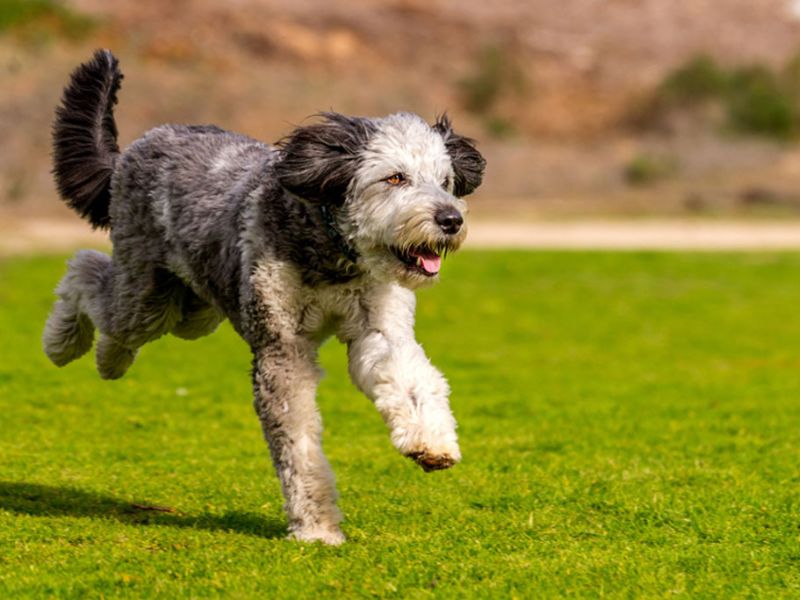
Ideal Living Environment for Aussiedoodles
An ideal home for them would be a house with a yard where they can zoom around and burn off their energy. If apartment living is more your style, no worries! Just make sure they have regular access to off-leash dog parks or other areas where they can run free and have a good frolic.
Ideal Owner for an Aussiedoodle
Aussiedoodle puppies thrive with active owners who can keep up with their playful spirit. Training sessions are essential, as a bored Aussiedoodle can easily become mischievous. Think destructive chewing, excessive barking, and other not-so-fun behaviors. So, if you’re looking for a cuddle buddy on the couch, an Aussiedoodle might not be your best fit. But for someone who enjoys an active lifestyle and fun training challenges, these pups can be amazing companions!
>>> Get inspired and choose a beautiful name for your dog with these country dog names!
2. How to Take Care of an Aussiedoodle Dog?
Health Issues
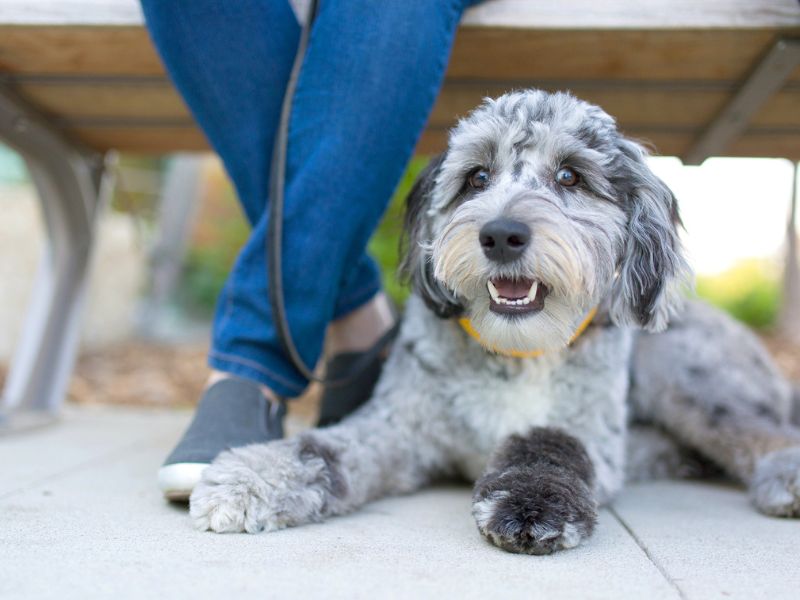
Aussiedoodles inherit some health tendencies from their parent breeds. While generally healthy, they might be susceptible to certain conditions that affect Australian Shepherds and Poodles. Regular veterinary checkups and good overall care are essential to keep your Aussiedoodle happy and healthy. Aussiedoodles can experience some health issues, including:
- Hip dysplasia
- Progressive retinal atrophy
- Ivermectin sensitivity
- Cataracts
According to OFA (Orthopedic Foundation for Animals), the following are the recommended health tests for adult Aussiedoodle dogs:
- ACVO Eye Examination
- DNA-based prcd-PRA (Progressive Rod-Cone Degeneration) test
- Veterinary Evaluation of Patellar Luxation
- Basic Cardiac Exam
- OFA Radiographic Elbow Evaluation
You should take your Aussiedoodle in for frequent examinations at the vet, just as you would any other dog, so that you may catch any potential health issues early. Also, get advice from your vet on how to best maintain your dog’s health.
>>>Check out our 40 top dog care tips to maintain your dog’s health and happy life!
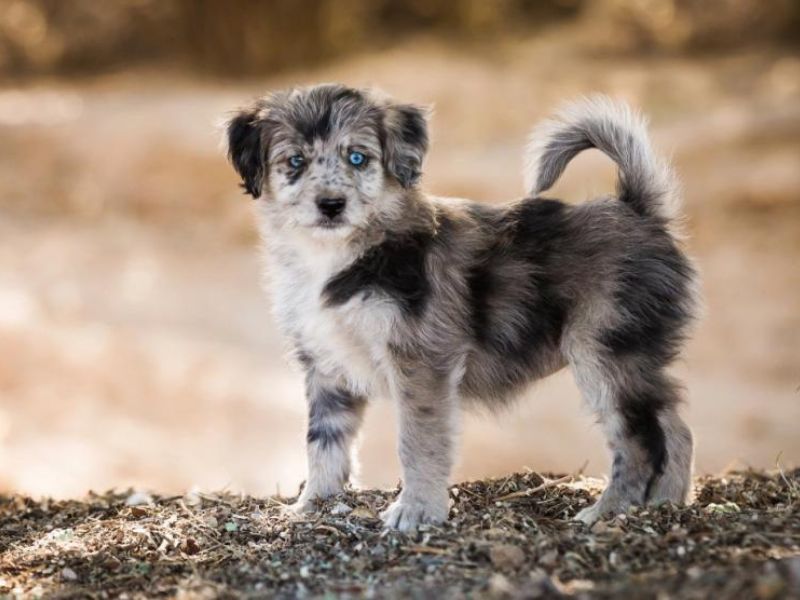
Aussiedoodle Grooming
Aussiedoodles are known for their beautiful coats, but keeping them that way takes some effort! Unlike some shedding breeds, Aussiedoodles require regular brushing to prevent mats. Brushing every other day is the minimum, but daily is even better. The key is to use a brush that reaches the undercoat to avoid hidden tangles near the skin. These mats can be uncomfortable for your pup and require professional grooming to remove.
Aussiepoos don’t need baths very often. Monthly baths are enough to keep them clean and maintain healthy skin and fur. Professional groomers are still recommended, though. Schedule appointments every 3 months or so to ensure their nails, ears, and other areas are neatly trimmed and healthy. This keeps your Aussiedoodle looking and feeling their best!
>>> Find out more helpful dog grooming tools for you to care for your dog safely at home!
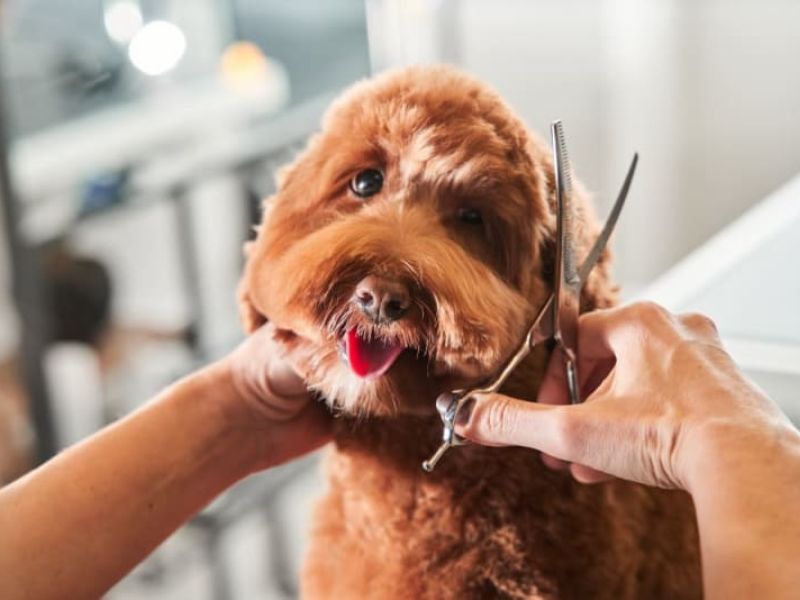
Training
The training process should begin as soon as possible when your Aussiedoodle puppies are 8 weeks old. Waiting until they are six months old will make them more stubborn.
Aussiedoodles are intelligent and eager to please, making training the basic tricks, like stay and come when called, a breeze. They love a good challenge, so keep them mentally stimulated with fun games and puzzles that engage their curious minds. Not only will this strengthen your bond, but it’s also a great way to prevent boredom and any destructive behaviors that might arise from a restless pup.
Early socialization is key to raising a well-rounded Aussiedoodle! Introduce them to new people, animals, places, and experiences from a young age. This helps them feel confident and comfortable exploring the world by your side. Remember, Aussiedoodles crave their loved ones’ approval. Their intelligence and charm make them highly trainable, so any effort you put into training will be well-rewarded with a happy, well-behaved pup!
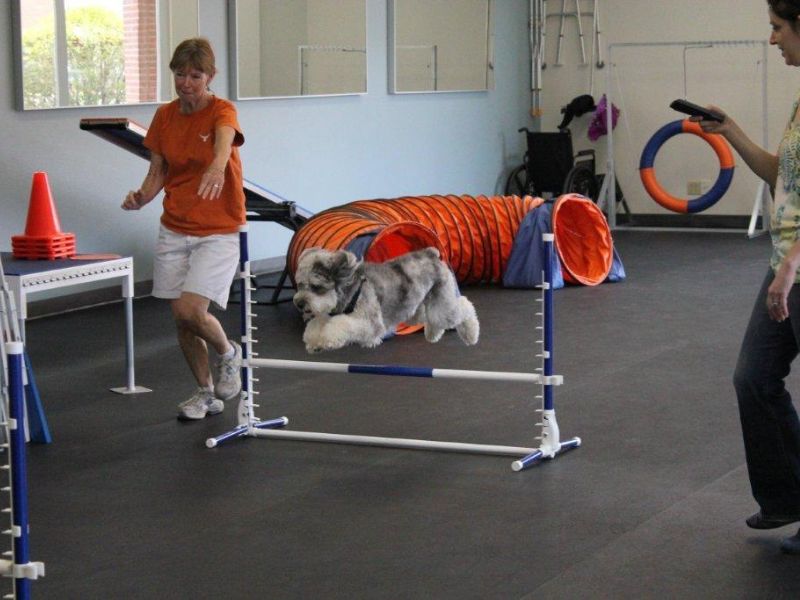
Exercise Needs
Aussiedoodles require at least one hour of exercise daily to keep them physically and mentally stimulated. This daily dose of exercise can be divided up in a few ways. Daily walks are a must, with an ideal schedule being two 30-minute walks or one longer walk supplemented by shorter playtime sessions throughout the day. Besides, engaging activities like fetch, frisbee, or agility training are fantastic options.
In addition to physical exercise, providing mental stimulation through puzzle toys, training sessions, or scent work is a great way to tire out their minds as well as their bodies. Mixing up your exercise routine with different activities will also help keep things interesting for your Aussiedoodle.
It’s important to note that exercise needs can vary depending on a few factors. Puppies, for example, will have shorter attention spans and require more frequent but shorter bursts of activity. As they mature, their stamina increases, allowing for longer walks and playtime sessions. Similarly, standard Aussiedoodle dogs might have higher exercise needs than their miniature counterparts.
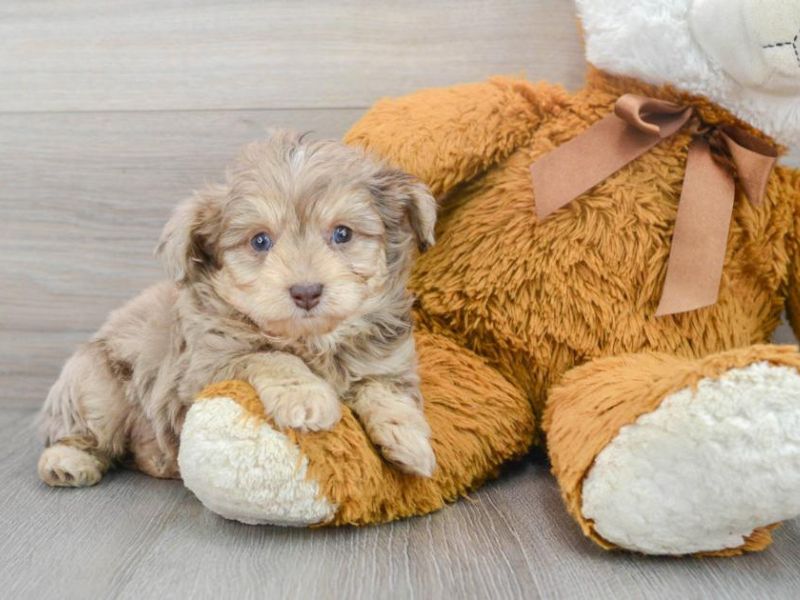
Nutrition
Since they’re active pups, choose a high-energy kibble formulated for small to medium-sized breeds. This will give them the nutrients they need to keep their energy levels up. Like their Australian Shepherd and Poodle parents, Aussiedoodles can be prone to weight gain if you’re not careful. To avoid this, maintain a consistent feeding schedule and avoid providing free access to food all day.
The Pet Food Institute‘s dietary recommendations for an active dog’s diet include protein, fat, and vitamins like A and D3. Vitamin A protects a dog’s eyesight and strengthens its immune system, while vitamin D3 keeps its bones healthy. The wavy coat on your Aussiepoo may be kept healthy with the help of fats, and the protein in their diet can provide the energy they need to run and play.
Side Note
Just like any dog, their puppyhood diet won’t be the same as what they need as an adult or senior. Consult your veterinarian to ensure your pup gets the best nutrition for each stage. They can factor in your Aussiedoodle’s weight, energy level, and overall health to create a personalized diet plan.
3. Getting an Aussiedoodle Dog
Aussiedoodle Price
Dreaming of adding an adorable Aussiedoodle to your life? Get ready to open your wallet because Aussiedoodle puppies can range in price from $1,500 to $3,500, with some rare cases reaching up to $5,000. If you want to buy an Aussiedoodle, always do research on trustworthy breeders.
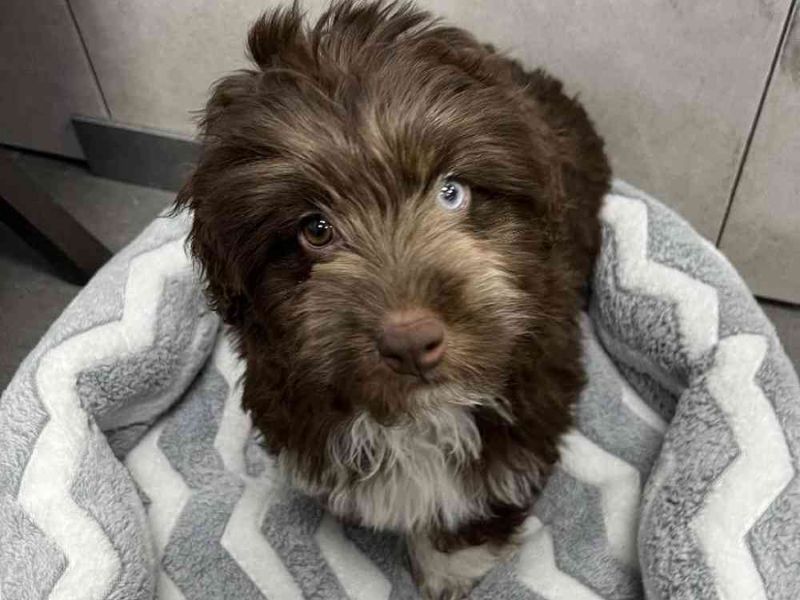
Aussiedoodle Breeders
Meeting your puppy’s parents and observing how the litter interacts with each other is highly recommended. This allows you to assess their size and temperament, giving you a better idea of what your future furry friend might look like when fully grown. A responsible breeder will also have documentation on the parents’ lineage and be able to explain the specific mix that makes up the litter. This information can help you understand your Aussiedoodle’s potential personality traits and needs.
The AKC hasn’t officially recognized Aussiedoodle yet, but that doesn’t mean finding a good breeder is impossible. These pups are quite popular, so finding a reputable breeder shouldn’t be too difficult.
Be on the lookout for puppy mills and online scams. By doing your research carefully, you can avoid supporting these cruel practices. Remember, choosing a responsible breeder who prioritizes ethical breeding and puppy socialization increases the chances of getting a happy, well-adjusted dog.
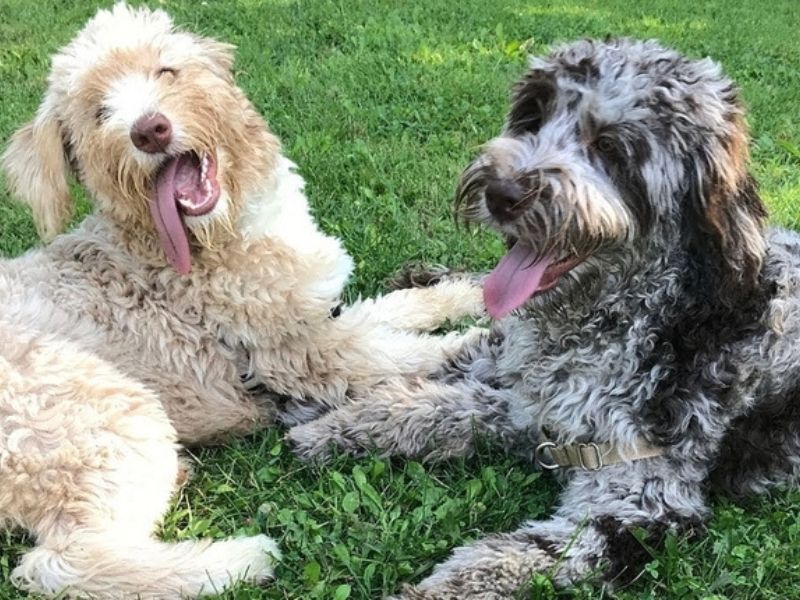
Aussiedoodle Adoption
Adopting an Aussiedoodle dog can save you money compared to buying one from a breeder. Pet adoption costs can be anything from $150 to $500, depending on age and size. The adoption fee for an older Aussiepoo is significantly lower than that of a puppy.
Since Aussiedoodles are mixed-breed pups, finding a rescue specifically for them might be challenging. But fear not! Australian Shepherd and Poodle rescues are a great alternative. These rescues often take in mixed breeds, including Aussiedoodles. Here are some rescues you can consider:
- Aussie And Me Animal Rescue (Florida)
- Aussie Rescue Placement Helpline (Utah)
- Lone Star Aussie Rescue (Texas / Oklahoma)
- Carolina Poodle Rescue
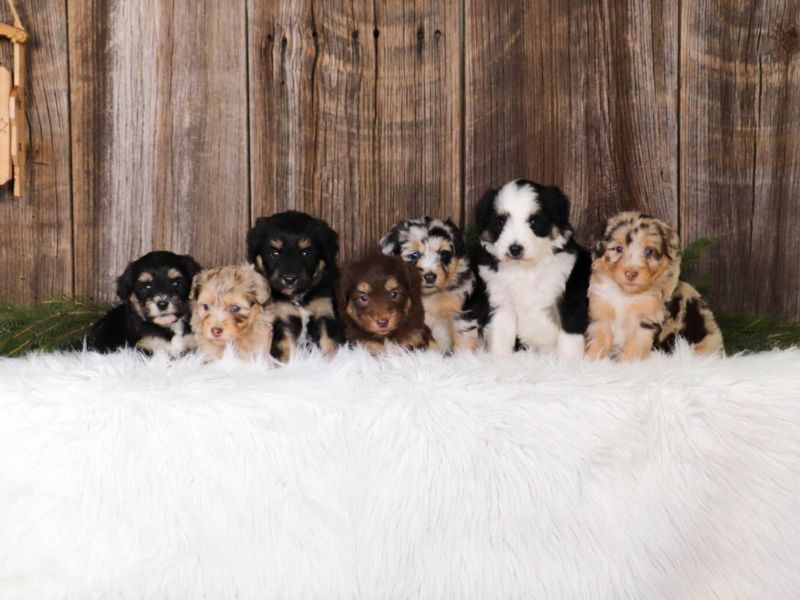
>>>Further reading:
- The Ultimate Guide to Dachshund Dog Breed: From Traits, Care and Training Tips
- The Essential Guide To Care For The Golden Retriever Dog
- Discovering The Great Dane Dog Breed: A Comprehensive Guide
- Top 14 Types Of Doodle Dog Breed: The Ultimate Guide
So, have Aussiedoodle dogs captured your heart? These intelligent, playful pups can be fantastic companions for active families and individuals. If you can provide them with the love, exercise, and mental stimulation they crave, an Aussiedoodle will reward you with years of loyalty, devotion, and unconditional love. Follow Canvas Personalized to discover more amazing dog breeds!







